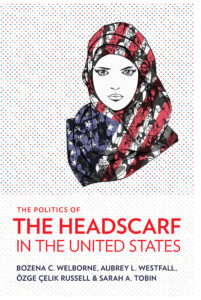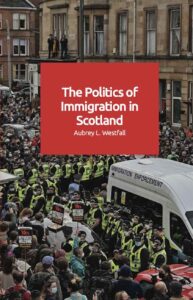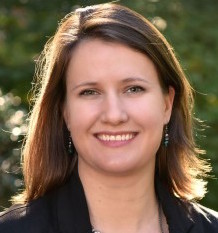Associate Professor of Political Science
Education
Ph.D., University of Colorado, Political Science (Comparative Politics), December 2010
M.A., University of Colorado, Political Science, May 2006
B.A., Westmont College, Political Science/Philosophy, May 2004 (summa cum laude)
About
Main Interests
Comparative Politics: Immigration and Citizenship, Minority Politics, European Politics, Women and Politics
International Relations: Human Rights, International Organizations
Courses
POLS 109 International Politics
POLS 215 Contemporary European Governments and Politics
POLS 229 United States Foreign Policy
POLS 285 Women and Politics
POLS 309 International Law and Organization
POLS 325 European Integration
Awards and Honors
Awarded: Nancy Weiss Malkiel Scholars Award, Woodrow Wilson National Fellowship Foundation, 2018.
Awarded: Marion and Jasper Whiting Foundation Fellowship. 2018.
Nomination: American Political Science Association Religion and Politics Section Best Paper Award “Representing Islam: Engaging the Political Implications of the Headscarf,” 2015.
Nomination: Virginia Outstanding Faculty Award, 2015.
Finalist: Virginia Outstanding Faculty Award, 2014.
Awarded: VFIC Mednick Memorial Fellowship, 2013.
Fulbright German Studies Seminar Grant, 2012.
Teaching Awards
Awarded: Samuel Nelson Gray Distinguished Teaching Award. Virginia Wesleyan College. 2014. Student nominated and selected, and awarded annually to one professor. Dr. Westfall was the first assistant faculty member to receive this award.
Nomination: Samuel Nelson Gray Distinguished Teaching Award. Virginia Wesleyan College. 2013.
Awarded: Distinguished Teaching Award, Department of Political Science (faculty-nominated graduate student award), 2007
Nominated: University Graduate Student Teaching Excellence Award, University of Colorado, 2005.
Publications
Books

Aubrey Westfall. (Anticipated 2022). The Politics of Immigration in Scotland. In production with Edinburgh University Press.
Bozena Welborne, Aubrey Westfall, Özge Çelik Russell, and Sarah Tobin. (2018). The Politics of the Headscarf in the United States. Cornell University Press.
Peer-reviewed publications
Nazita Lajevardi, Kassra Oskooii, Hannah Walker, Aubrey Westfall. (2020). “The Paradox Between Integration and Perceived Discrimination Among Muslim Americans.” Political Psychology (41:3): 587-606.
Aubrey Westfall. (2019). “Mosque Involvement and Political Engagement in the United States.” Politics and Religion: (12:2)
Aubrey Westfall and Özge Çelik Russell. (2019) “The Political Effects of Religious Cues.” Oxford Research Encyclopedia of Politics.
Aubrey Westfall. (2018) “Mosques and Political Engagement in Europe and North America.” POMEPS Studies 32: The Politics of Islam in Europe and North America. https://pomeps.org/2018/12/18/pomeps-studies-32-the-politics-of-islam-in-europe-and-north-america/
Westfall, Aubrey, Ozge Celik Russell, Bozena Welborne, Sarah Tobin. (2017). “Islamic Headcovering and Political Engagement: The Power of Social Networks.” Politics and Religion 10(1): 3-30.
Aubrey Westfall. (2016). “European Reform from the Bottom Up? The Presence and Effects of Cosmopolitan Values in German Public Opinion” In Cosmopolitanism Reconsidered: Jürgen Habermas, Germany and the European Union, Eds. Gaspare Genna, Ian Wilson and Thomas Haakenson. Routledge.
Aubrey Westfall, Carissa Chantiles (student). (2016). ”The Political Cure: Gender Quotas and Women’s Health.” Politics & Gender, 12(3): 469-490.
Westfall, Aubrey, Bozena Welborne, Sarah Tobin and Ozge Celik Russell. (2016). “The Complexity of Covering: The Religious, Social and Political Dynamics of Islamic Practice in the United States.” Social Science Quarterly 97(3): 771-790.
Berry, Michael & Aubrey Westfall. (2015). “Dial D for distraction: The making and breaking of cell phone policies in the college classroom.” College Teaching 63(2).
Westfall, Aubrey. (2013). “The Consequences of Crisis: A Call for Measured Optimism.” German Studies Review 36(1).
Other publications/appearances
Aubrey Westfall. (2020). Book Review: The State and Religious Minorities in Turvey and France by Ramazan Kilnç. Political Science Quarterly 135(4): 747-749.
Bozena Welborne, Aubrey Westfall, Özge Çelik Russell, Sarah Tobin. (2020) Critical Dialogue: “Muslims in a Post-9/11 America: A Survey of Attitudes and Beliefs and their Implications for U.S. National Security Policy by Rachel Gillum”. Perspectives on Politics 18(4)
Bozena Welborne, Aubrey Westfall, Özge Çelik Russell, Sarah Tobin. (2020) Critical Dialogue: “Response to Rachel Gillum’s Review of the Politics of the Headscarf in the United States”. Perspectives on Politics 18(4).
Kate Mason and Aubrey Westfall. “Guest Column: Move to Expel International Students Hurts the US.” July 15, 2020. The Sun Chronicle. https://www.thesunchronicle.com/opinion/columns/guest-column-move-to-expel-international-students-hurts-the-u-s/article_9c33830e-028c-5034-a6c4-d67953fd4c6a.html
Aubrey Westfall and Bozena Welborne. “Commentary: With Muslim-American women on the ballot, we all win.” October 15, 2018. Times Union. https://www.timesunion.com/opinion/article/Commentary-With-Muslim-American-women-on-the-13309838.php
Aubrey Westfall. October 12, 2018. The Academic Minute. https://academicminute.org/2018/10/aubrey-westfall-wheaton-college-the-politics-of-the-headscarf/
Aubrey Westfall. “Fight Islamic Radicalization by Welcoming Mosques into your Communities.” November 13, 2017. The Philadelphia Inquirer. http://www.philly.com/philly/opinion/commentary/mosques-islamic-terrorism-radicalization-omar-mateen-sayfullo-saipov-20171115.html
Aubrey Westfall. “Mosques, Social Networks, and the Political Engagement of Muslim-American Women.” June 22, 2017. Religion in Public. https://religioninpublic.blog/2017/06/22/mosques-social-networks-and-the-political-engagement-of-muslim-american-women/
Aubrey Westfall. “Scotland’s Unique Approach to Immigration Threatened by Brexit…” Babe LincolnSpring: 2017:2.
Teaching Philosophy
My experiences as a student of the liberal arts formed the foundation of my teaching philosophy. My professors engaged their students as individuals through active, discussion-oriented classes, and these methods gave me confidence in my intellectual capability. Inspired by my own experience, my main ambition is to create a climate where my students feel supported and empowered to learn and change. Most commonly this involves active learning, which uses classroom tactics that engage students in their own learning process. I am also a strong believer in experiential learning, which allows “students to ‘discover’ knowledge by direct experience, either simulated or real.”[1] Because my commitment to social justice propels my research and teaching, I am motivated to teach subjects where students can immediately integrate the lessons from the classroom into their lives, making my courses particularly well suited for active and experiential techniques.
[1] Nilson, Linda B. Teaching at its best: A research-based resource for college instructors (John Wiley & Sons, 2010), 119.
Research Interests
My research explores the policies and sociopolitical practices regulating the political behavior of minoritized groups within Western democratic societies. Groups of interest include immigrants, women, and ethnic or religious minorities. The issues animating my research involve questions of how minoritized groups engage in politics, how best to represent the interests of minoritized populations, the extension of democratic rights, and the intersection of secular democracy and religious pluralism in Europe and North America. My research engages with quantitative and qualitative methodologies, including several years of fieldwork conducting interviews and focus groups in Europe and the United States. My research has been supported by Fulbright, the European Commission, and the Woodrow Wilson Foundation.
I am very proud of my co-authored book The Politics of the Headscarf in the United States, published with Cornell University Press in 2018. We find that while headcovering is not heavily politicized in the US like it is in other contexts, it accentuates and engages Muslim identity in uniquely American ways. The nearly 2,000 Muslim women we surveyed and the 72 women we interviewed in focus groupsdemonstrated strong threads of American-style individualism and agency that run through their religious practice. Those same traits shape how they engage with politics and civic life as headcovering serves as a marker around which Muslims and non-Muslims orient their social interactions – Muslims view the headcovering as a signal of like-mindedness and potential for community development, while non-Muslims react to it as a marker of foreignness and a basis for discrimination. The access headcovering provides to the mosque is especially important for determining political behaviors because it introduces women to an institution that affirms religious identity while building ties to the wider community. We found increased mosque attendance grew socio-culturally heterogeneous networks, which were positively associated with political engagement. Our work ultimately shows that Muslim women can and do politically integrate in secular societies and Muslim-American women’s adherence to Islam and religious institutions assists the process.
The exploration of these themes sparked several other lines of inquiry relating to the political lives of Muslims in democratic contexts. A long-term project engages with unique survey data to explore the civic engagement of Muslims in Canada, France, Germany, the United Kingdom, and the United States.
I am also in the final stages of a book project entitled The Politics of Immigration in Scotland, which is in production with Edinburgh University Press. While most nationalists worldwide fear immigration will dilute their national culture, pro-immigrant advocacy has become a critical element of nationalism and nation-building in Scotland. Elite-level endorsement of immigration and diversity serves Scotland’s moral and strategic interests, and is a symbol of Scotland’s distinction from England, which justifies arguments for further devolution or ultimately independence.
This book examines the central features of Scotland’s social and political environment that provide an opportunity for the development of pro-immigration policy preferences. It evaluates how well those preferences are communicated with quantitative and qualitative analysis of primary and secondary data. The book also analyses the elite and mass divergence in understandings of Scottish identity and the desirability of immigration, which threatens the implementation of the government’s multicultural policies. It illustrates the extent of the divergence and presents recommendations for how Scottish leaders can bridge the gap.
